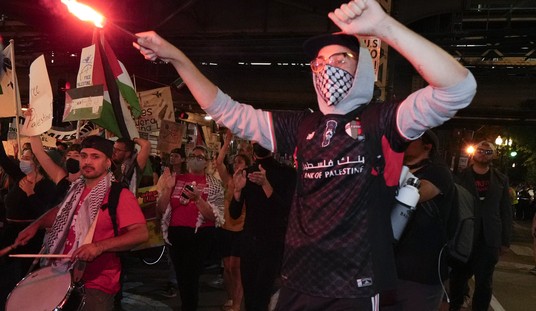The prisoners at the Guantanamo Bay detention center appear to be feeling their oats of late. Several dozen of the detainees have been on a hunger strike since February, protesting “the confiscation of letters, photographs and legal mail, and the rough handling of Korans during searches of their cells.” Other prisoners cite President Obama’s failure to live up to his promise to close the facility as a reason for the hunger strike.
In an effort to break the strike, the military decided to place the prisoners in individual cells rather than allow them to live in a communal area. During the transfer, several prisoners apparently attacked their guards, necessitating a response.
Durand said in a statement that some detainees “resisted with improvised weapons, and in response, four less-than-lethal rounds were fired.”
He said there were no serious injuries to guards or detainees.
The hunger strike began in early February after detainees said the guard force initiated new and aggressive sweeps of the cells that they alleged included inappropriate searches of the detainees’ Korans. The military acknowledged that Korans were searched for contraband, but said they were handled only by interpreters, most of whom are Muslim, not the guard force.
Lawyers for the detainees, the military and the International Committee for the Red Cross agree that the hunger strike is also born of a deeper frustration that the Obama administration has abandoned any real effort to close the facility.
There are 166 detainees at Guantanamo, and dozens of them were cleared for transfer out of Guantanamo Bay by an interagency review panel. The Obama administration has not yet started another promised review process. And it closed the office in the State Department that was charged with getting the cleared detainees home or resettled in third countries.
The administration has said that Congress has blocked its ability to act, but lawyers and human rights groups say that the administration could still move out some detainees. They charge that the White House is unwilling to fight for its 2009 executive order to close the facility in Cuba.
The detainees are not wanted back in their home countries, and few other nations are willing to shelter someone who has spent a decade in prison for terrorism. They can’t stay here and they don’t want to live in Guantanamo, so what are we to do with them?
Human rights groups want the U.S. to release all but a handful of the detainees, but they never get around to saying where they will go and who would take them in. Perhaps some countries who have been the loudest in denouncing the U.S. because of Guantanamo will step forward and volunteer to take them in. Don’t hold your breath.
The bottom line is that about a quarter of detainees at Guantanamo — if history is any guide — will “re-engage” and go back to being a terrorist if they are released. Do you want to be responsible for deciding which detainees will go straight and which won’t?
Neither does the president.










Join the conversation as a VIP Member